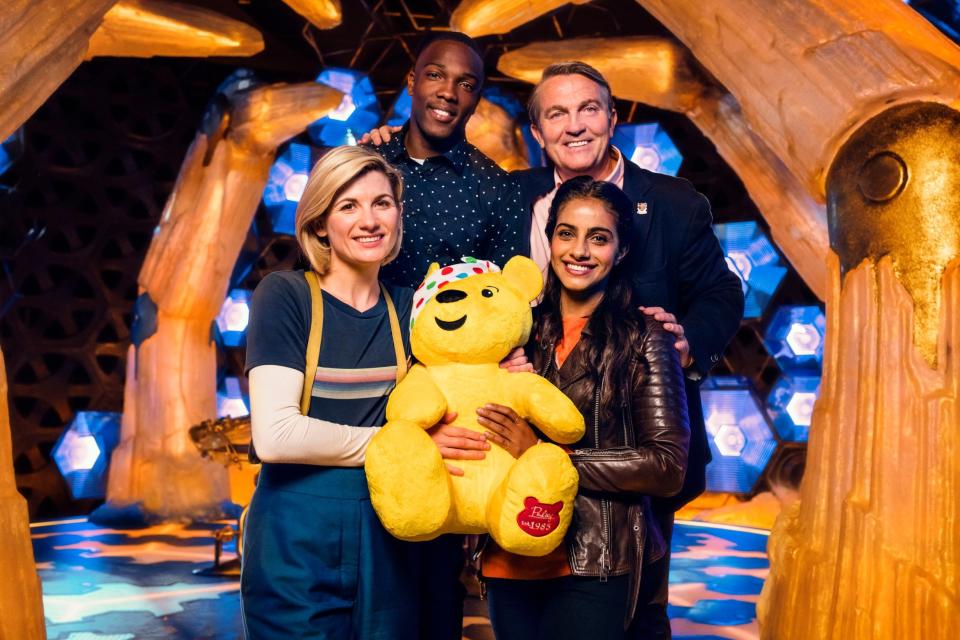It took decades for Children in Need to raise £1bn – wouldn’t it be more efficient to raise taxes?
Who can resist? The stars of Eastenders belting out Disney classics. Boyzone casting off a quickstep in front of the Strictly judges. Dr. Who’s Jodie Whittaker surprising a fan. All strung together with eminent professionalism by TV’s starriest presenters. It’s been another glittering year for Children in Need. Not only did the BBC’s official charity surpass its record for fundraising on that special evening, it also reached the milestone of raising over £1bn since Sir Terry Wogan launched the very first appeal in 1980.
Pudsey has doubtless done enormous good over the years and kept the nation entertained and engaged with children’s charities for decades. But there’s always a grinch to spoil the fun by putting things in perspective. The truth is that the amount Children in Need raise is tiny compared to the scale of the challenge facing the country of neglected, abused and vulnerable kids.
The 150 councils that provide children’s social care burn through £1bn in just six weeks. Thirty-eight years of off-key newsreaders, straight-to-camera appeals and baked bean baths to match just 11 per cent of the annual spending on troubled children. The money raised this year – almost £51 million – is less than the average spent by a single council in a year on children’s services.
Under normal circumstances, you could argue that this doesn’t matter, that every little helps and another few million bunged the way of kids who really need it is surely no bad thing. But the truth is that children’s services across the country are now in crisis. While the stars of screen and stage are patting themselves on the back for doing good, the fabric of the care provided by the public sector is shredding. A £3bn black hole is opening up in the funding for children’s services according to the Local Government Association. Or to put that in Children in Need terms: 114 years of fundraising.
The number of children requiring help from councils has doubled in the last decade and a growing number of these are older children with more complex problems. The resulting pressures on children’s social workers are so intense that numerous roles remain vacant or can only be filled on a temporary basis. Money set aside to provide early help to children at risk of abuse or neglect has been cut by the government and what is left is increasingly used by councils to keep up with demand from kids already in trouble.
Maybe it’s easy to imagine that the children supported by the public sector are somehow different from those highlighted by Children in Need every November. They aren’t. Of the 400,000 young people helped by councils last year, over 50 per cent were facing abuse or neglect, 15 per cent were enduring severe family dysfunction, 8 per cent were struggling with disability or illness.
One key lesson here, of course, is that a functioning public sector based on taxation is a fundamental pre-requisite of a civilised, humane society. We may laud charity and moan about tax, but the truth is the latter is a far more reliable route to making sure the most vulnerable are cared for than the former.
More specifically though, the nation’s celebrities should recognise that if they want to do all they can to help children in need, then they must do more than spend one evening a year singing songs and telling jokes. They need to speak up for the tens of thousands of children being denied adequate support and care for the want of decent public funding.
The combined profile of just a handful of them is enormous. Messages about this pressed on chat shows, in newspaper interviews and through the social media accounts of the famous could turn an emerging national scandal into a good news story.
For some celebrities, this may all sound too political. After all, raising donations for disabled children on telly one night a year is less controversial than telling the Chancellor to get moving and find the money for kids at risk. But there comes a point where an issue ceases to be purely political and becomes a simple matter of morality and common human decency. That point has now been reached with children’s services.
So please celebrities, do keep raising vital cash every year with that engaging mix of laughter and tears. But in between, lend your voices to an even bigger cause and make sure every single child in need can get the help they require.
Adam Lent is director of the New Local Government Network

 Yahoo News
Yahoo News 

